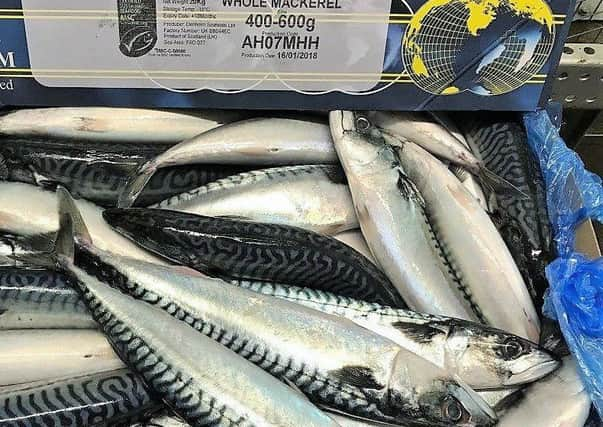With sales at £150m a year fish are good for the economy '“and dinner table


The fish in question are mackerel and herring, a precious natural resource from around Scotland’s shores which are in strong demand in international and UK markets. They also tick all the right boxes for consumers – tasty, healthy to eat and sourced from sustainable fisheries.
And with the Scottish Government’s ‘Ambition 2030’ strategy to cement Scottish food and drink as our most valuable industry, with the opportunity to more than double turnover in the sector to reach £30 billion by 2030, it is apparent that our mackerel and herring industry can play a key role in reaching this target.
Advertisement
Hide AdAdvertisement
Hide AdMackerel is of particular importance to Scotland and is sold in markets in South-east Asia, the Baltic States, Belarus, Ukraine, Poland, France, Germany and the Netherlands. While the herring market is much smaller in comparison to mackerel, it is nonetheless still valuable with there being key markets in western Europe and Poland.


These oily fish are a major export earner for Scotland, with the pelagic (mackerel and herring) processing industry playing a vital role in our economy by handling what is by far the largest volume catch of fish. This part of our onshore processing sector also handles blue whiting mostly destined for markets in West Africa.
The Scottish processing sector handles somewhere in the region of 150,000 tonnes of premium mackerel and herring each year, worth approximately £150m in sales. During the peak season, around 2,000 people are employed in factories based mainly in the North-east and Shetland, creating a major economic boost to our fragile coastal communities.
The UK market is crucial as well, and growing all the time, especially since there is now widespread recognition that not only does mackerel and herring taste great, but they are healthy to eat too, being packed full of heart-healthy Omega 3 fatty acids and essential minerals and vitamins. Indeed, health experts recommend that we should eat two portions of fish a week, one of which should be an oily fish such as herring or mackerel.
As an example of the growth in domestic sales, in the mid-1970s the consumption of mackerel in the UK was virtually zero, but today there is a wide range of smoked mackerel in retailers, as well as canned mackerel. Herring is popular too, and is such a versatile fish, with fresh fillets in good demand when in season, and other year-round favourites being available that include kippers (smoked herring) and marinated herring.
For the future, our processing sector is committed to developing both export and domestic markets and is continuing to invest in new equipment to help keep us competitive, as well as devoting resources towards new product development. In particular, we are looking to increase our volume sales into Asian markets such as Japan and South Korea. However, developing such growth will prove challenging, not least because we compete against other processing countries which enjoy major financial marketing support from their governments whereas we do not.
Furthermore, growth can only be achieved if we have the raw material supplies, which is why the sustainability of Scottish pelagic fishing operations is crucial. Of foremost importance, of course, is the need to protect the marine environment, and by ensuring that catches are carefully regulated under international agreement and scientific advice, then we can ensure the long-term sustainability of our valuable pelagic stocks.
This is why the Scottish Pelagic Processors Association is an active member of the Scottish Pelagic Sustainability Group, which was set up by the industry in 2006 to ensure the pelagic sector is truly sustainable. An over-riding aim was to achieve the Marine Stewardship Council (MSC) ecolabel certification for our key pelagic stocks, such as North Sea herring and mackerel, which has been achieved now for a number of years.
Advertisement
Hide AdAdvertisement
Hide AdThere is no doubt that Scotland’s pelagic sector, both catching and onshore, is a good news story for our economy by supplying a nutritious, delicious and sustainably caught protein for both home and international consumption. We are indeed fortunate in having such a rich resource around our shores, and with continuing sustainable management, it is one that will last long after our offshore oil and gas reserves run out.
Robert Duthie, Scottish Pelagic Processors Association